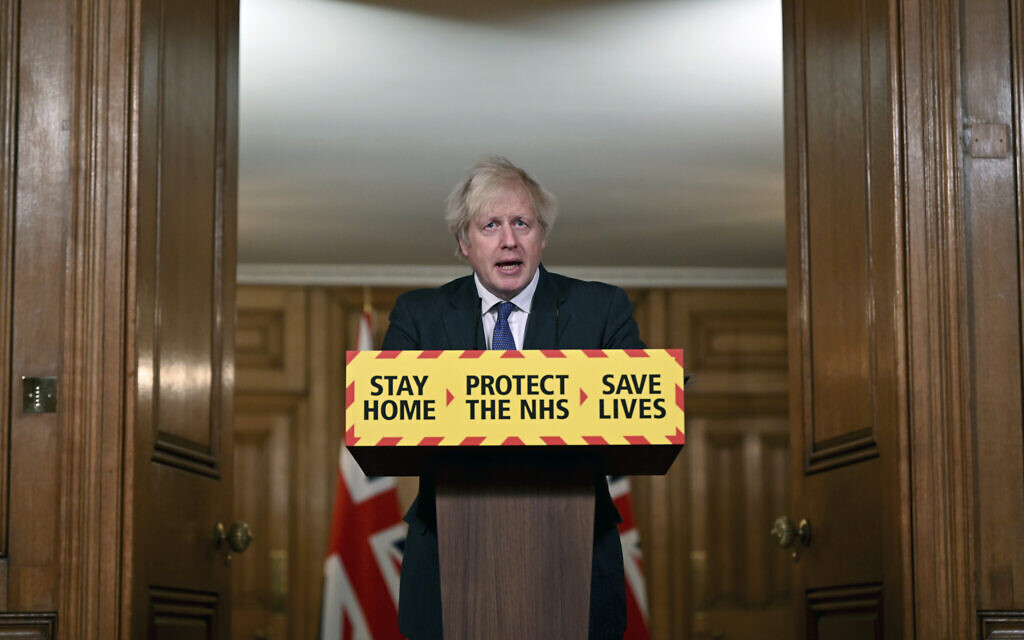There is some evidence that a new variant of the coronavirus first identified in southeastern England carries a greater risk of death than the original strain, the British government’s top scientific adviser said on Friday – although he emphasized that the data are uncertain.
Patrick Vallance said at a news conference that “there is evidence that there is a greater risk for those who have the new variant”.
He said that for a 60-year-old man with the original version of the virus, “the average risk is that, for 1,000 infected people, about 10 are expected to die unfortunately.”
Get the daily edition of The Times of Israel by email and never miss our top news.
“With the new variant, for 1,000 infected people, about 13 or 14 people are expected to die,” he said.
But Vallance emphasized that “the evidence is not yet strong” and more research is needed.
In contrast, he said, there is a growing belief that the variant is more transmissible than the original coronavirus strain. He said it appears to be between 30% and 70% more easily passed on.
“I don’t think this virus is going anywhere,” he said. “It will probably last forever,” said Vallance.
Herd immunity in Israel
Asked about the report, a leading Israeli expert said the UK variant would make it much more difficult for the country to achieve collective immunity.
Noting that it was “much more contagious”, Prof. Gili Regev of the Sheba Medical Center in Tel Aviv told Channel 12 that, instead of being able to obtain collective immunity after vaccinating between 60 to 75% of the population, Israel would now have to vaccinate more than 75% and possibly up to 90%.
“This means that it will take much longer, mainly because we are not vaccinating children,” she said.

Prof. Gili Regev-Yochai, director of the infection, prevention and control unit at Sheba Medical Center in Tel-Hashomer (screenshot from Youtube)
“We are a long way from the end of this pandemic,” said Regev, but noted that Israel was ending the first phase of the fight with COVID-19.
In Israel, nearly 2.5 million people received their first dose of the vaccine by Friday, with nearly 900,000 of them receiving a second dose.
Regev said his hospital noticed a “significant” drop in infections and a jump in antibodies in those who received a second dose and anticipated that this would begin to affect the number of viruses in the coming weeks.
The deputy director of the Ministry of Health, Itamar Grotto, told Canal 13 on Friday that health officials fear the entry of more variants of the virus from abroad and recommend reducing international travel.
“Within the country, we are successfully vaccinating and the blockade is starting to show results,” said Grotto, but due to the variations, “Our recommendation is to reduce Israel travel as much as possible for a short period of time.”
Once more Israelis are vaccinated, the public will be better protected against future outbreaks of virus variants and travel restrictions can be eased, he said.
Studying the new variant
Maria Van Kerkhove, technical leader of the World Health Organization at COVID-19, said that studies are underway to examine the transmission and severity of new variants of the virus.
She said that so far “they have not seen an increase in severity”, but that more transmission could lead to “an overburdened health system” and therefore more deaths.
British officials say they are confident that vaccines authorized for use against COVID-19 will be effective against the new strain identified in the country.
But Vallance said the scientists are concerned that the variants identified in Brazil and South Africa may be more resistant to vaccines, adding that more research needs to be done.
Concerns about the newly identified variants have spawned a series of new travel restrictions around the world. Many countries have closed their borders to travelers from Britain, and the UK has suspended flights from Brazil and South Africa.

A man eats take-out food on the steps of St. Paul’s Cathedral, in London’s financial district, Friday, January 22, 2021, during England’s third national blockade since the coronavirus outbreak began. (AP Photo / Matt Dunham)
Prime Minister Boris Johnson said there could be more restrictions.
“We may need to go further to protect our borders,” he said.
Britain recorded 95,981 deaths among people who tested positive for coronavirus, the highest confirmed total in Europe.
The UK is currently in a blockade in an attempt to delay the most recent outbreak of the coronavirus outbreak. Pubs, restaurants, entertainment venues and many stores are closed, and people are forced to stay at home.
The number of new infections has started to drop, but deaths remain agonizingly high, averaging more than 1,000 a day, and the number of hospitalized patients is 80% higher than at the first pandemic peak in spring.
Johnson, who is often accused of making overly optimistic predictions about easing coronavirus restrictions, looked bleak.
“We will have to live with the coronavirus in one way or another for a long time,” he said, adding that “it is an open question” when measures could be relaxed.
“At this stage, you have to be really, really cautious,” he said.
